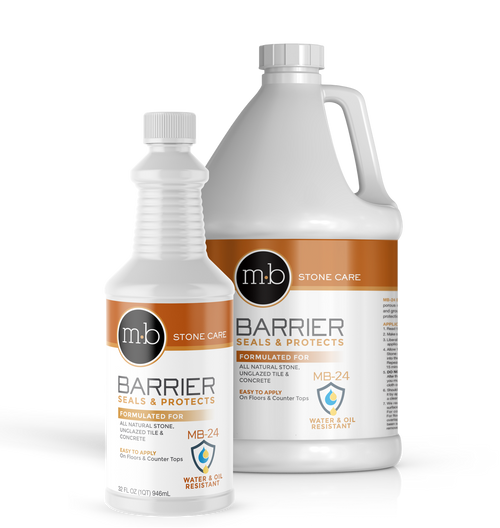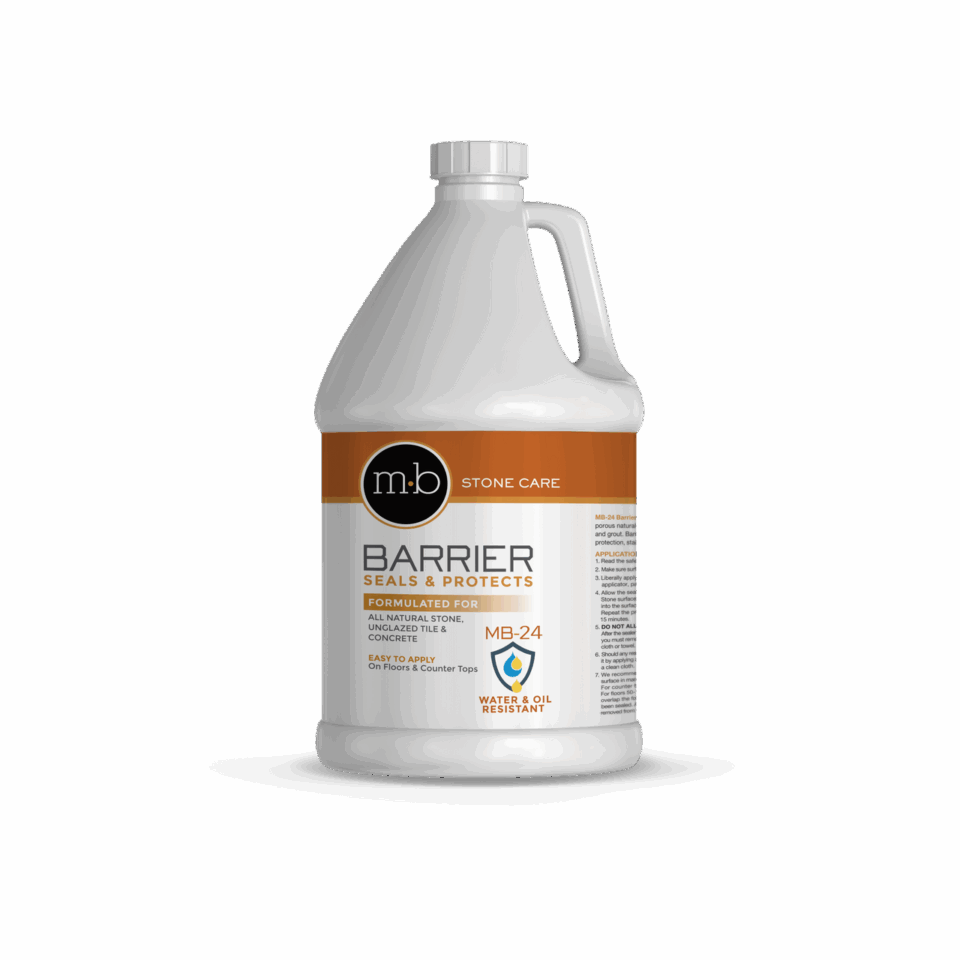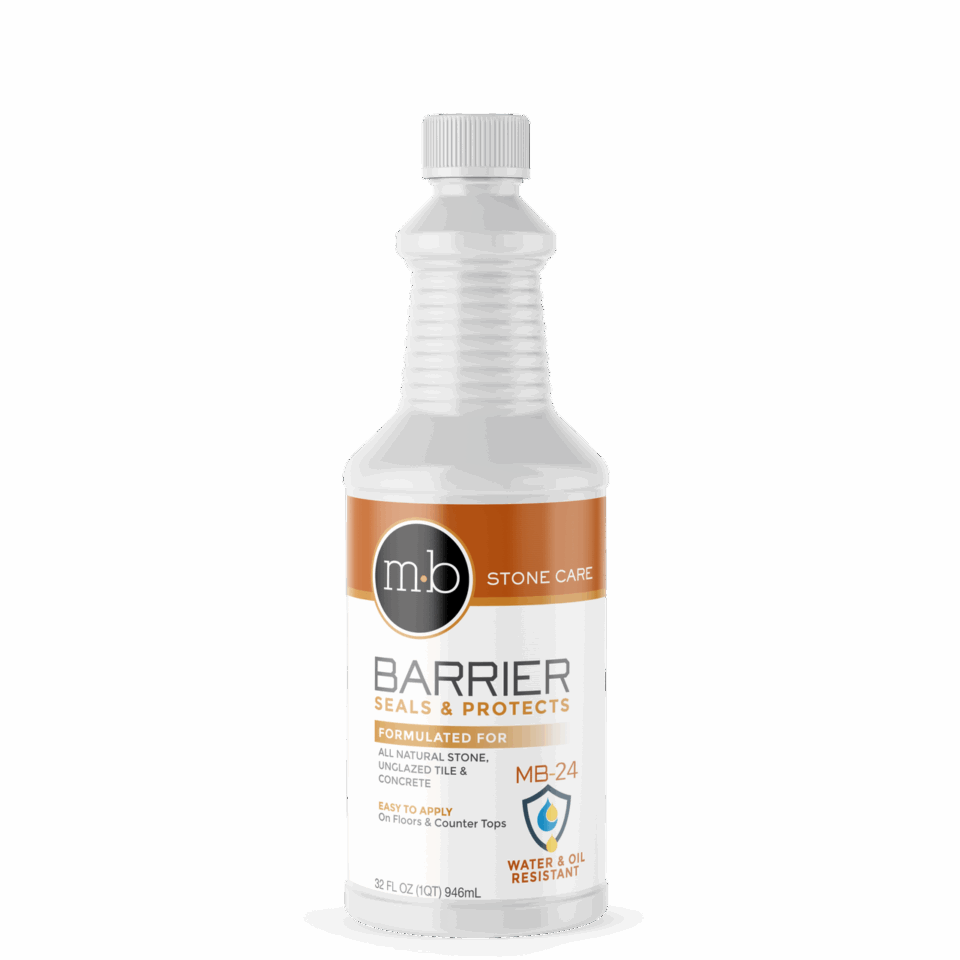MB-24 Barrier
About the Product
Guide
Reviews
MB-24 Barrier is a formidable water based penetrating stone care granite sealer for all porous natural stone, concrete, terrazzo, terra cotta, saltillo, slate, and grout. MB-24 Barrier will provide excellent hydrophobic and oleophobic protection, stain resistance, and easier stain clean up. Safe to use on food prep surfaces.
Directions for use:
Read the safety data sheet completely before use (found at top of page under RESOURCES).
Make sure surface is dry and free from soils, waxes, sealers, and/or coatings.
Liberally apply an even coat on the surface being treated using a lambswool applicator, paint brush, low pressure sprayer, or spray bottle.
Allow the sealer to soak into the stone surface for up to 30 minutes, while moving the sealer around to avoid drying on the surface during dwell time. Stone surfaces will have different rates of porosity. If the sealer absorbs into the surface in under 10 minutes, multiple applications will be needed. Repeat the process until the sealer stays wet on the surface for more than 15 minutes.
DO NOT ALLOW EXCESS SEALER TO DRY ON THE SURFACE. After the sealer has remained wet on the surface for approximately 20 minutes, you must remove all sealer and residue from the surface with a dry cloth or towel.
Should any residue be left or dried on the surface, you may be able to remove it by applying a light coat of sealer to the affected area and buff it off using a clean cloth.
We recommend that you complete the first application of the entire surface in manageable sections, so the sealer does not dry on the surface. For countertops, we recommend working 7 to 8 linear foot sections. For floors, 50 to 100 square foot sections. Complete one section and then overlap the following section using steps 3-5 until the entire surface has been sealed. At this point, all excess sealer and residue should have been removed from the first application. Perform a second application, if needed.
All stone surfaces are different, maximum stain protection is after sealer has fully cured. This takes 24 to 36 hours.
When properly applied and cared for, MB-24 Barrier will protect for 3 to 5 years.
Coverage: 150 sq ft to 250 sq ft per quart.
Made in the USA
Frequently Asked Questions About Our Stonecare Granite Sealer
In the section below, we answer some of the most-asked questions about MB-24 Barrier.
What is a stone sealer, and what is it used for?
A stone sealer is exactly as it sounds. It creates a barrier, protecting the surface from food, liquids, and more. This is essential for preventing the formation of stains, which can be tricky to remove.
Do I really need to seal my natural stone surfaces?
Periodic sealing is essential for any natural stone. This is because natural stone is a porous substance by nature, meaning it may take in liquids, bacteria, and food particles. A sealer forms flexible molecular links, protecting the surface.
What steps must I follow before applying a stone sealer to natural stone?
It is important to ensure that you have a clean stone surface. The stone should be thoroughly cleaned and free of any waxes, stains, or topical finishes. It should also be completely dry.
Which natural stone surfaces is this product suitable for?
You can use MB-24 Barrier on any porous natural stone. This includes marble, granite, and more.
Can I use it on food contact surfaces?
Yes. This product can be used on natural stone countertops that may come into contact with food. However, it’s important to allow it to cure completely, which takes 48 to 72 hours.
How long will it protect stone surfaces, and how often will I need to reapply it?
That depends on various factors, such as how often the product is used, how porous your stone surface is, and more. On average, it should last three to five years, but we recommend doing a water test every so often to determine if the stone needs to be sealed.
What happens if excess sealer dries on my stone surface?
If you allow this product to dry on your natural stone, it will become streaky or cloudy. This will also depend on how much excess product is allowed to dry. If you have only a little bit, then try cleaning it up with a pH-neutral cleaner like Easy Oxy.
Suppose there is quite a bit of excess. In that case, you should send us photos, and we can help determine the best next step.
Where can I learn more about this product?
You can use one of the following means of communication if you need to know more about stone care:
- International customers can get in touch with us by sending an email to mail@mbstonecare.com or using the live chat feature on our website.
• US customers can call us at 888-509-5831.
What safety precautions do I need to take when using this sealer on my solid stone surfaces?
Always read the SDS before using any stone care product. MB-24 may release moisture vapors in the presence of heat.
Although this product is VOC-free, you should still use proper personal protective equipment and follow the directions. We recommend using gloves and eye protection when working with this impregnating sealer.
Still have questions? Contact us today for more information!
Preparation:
- Read the safety data sheet completely before use (found on the More Information tab above).
- Make sure the surface is dry and free from soils, waxes, sealers, and/or coatings.
Directions:
- Liberally apply an even coat on the surface being treated using a lambswool applicator, paint brush, low-pressure sprayer, or spray bottle.
- Allow the sealer to soak into the stone’s surface for up to 30 minutes while moving the sealer around to avoid drying on the surface during dwell time. Stone surfaces will have different rates of porosity. If the sealer absorbs into the surface in under 10 minutes, multiple applications will be needed. Repeat the process until the sealer stays wet on the surface for more than 15 minutes.
- DO NOT ALLOW EXCESS SEALER TO DRY ON THE SURFACE. After the sealer has remained wet on the surface for approximately 20 minutes, you must remove all sealer and residue from the surface with a dry cloth or towel.
- Should any residue be left or dried on the surface, you may be able to remove it by applying a light coat of sealer to the affected area and buff it off using a clean cloth.
- We recommend that you complete the first application of the entire surface in manageable sections, so the sealer does not dry on the surface. For countertops, we recommend working 7 to 8 linear-foot sections. For floors, 50 to 100 square foot sections.
- Complete one section and then overlap the following section using steps 3-5 until the entire surface has been sealed. At this point, all excess sealer and residue should have been removed from the first application. Perform a second application, if needed.


